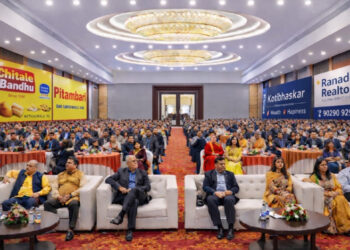- Mr. Narayan Singh Rao, Chief Growth Officer, PoGoSo Social
India’s rich democratic legacy has endured through the ages, evolving to meet the needs of its dynamic populace. From ancient democratic ideals enshrined in texts like the Rig Veda to the modern constitutional framework, the essence of Indian democracy has always centered around the active participation of its citizens. Emerging from the shadows of colonial rule in 1947, India prioritized the establishment of democratic freedoms, laying the foundation for an inclusive governance model.
In the years since independence, India has witnessed a profound transformation. With a burgeoning population exceeding 1.4 billion, including nearly 1 billion eligible voters, and the pervasive influence of the Internet, societal dynamics have undergone a paradigm shift. Today’s citizens are not only interconnected but also well-informed and assertive of their rights, transcending geographical boundaries in a global quest for participatory governance.
However, despite these advancements, a palpable gap persists between the aspirations of the 21st century and the antiquated mechanisms of democratic governance. The ritualistic exercise of periodic voting no longer suffices for an electorate yearning for continuous engagement in decision-making processes. This global outcry for transformation underscores the urgent need to reimagine democratic practices for contemporary imperatives. In this endeavor, India stands poised to lead, spearheading the reinvention of democracy to align with the pulse of the modern era.
At the heart of this transformative journey lies the imperative to cultivate an agile system that remains attuned to the voices of its citizens. Presently, social media platforms such as X (formerly Twitter) and Facebook serve as virtual town squares, facilitating expression and discourse. However, their current trajectory prioritizes sensationalism over substantive dialogue, perpetuating polarization and eroding trust—a precarious trend that poses a threat to democracies worldwide.
Unlocking the transformative potential of these platforms requires a strategic overhaul, characterized by the following key pillars:
– Aspirational Engagement: Transition from superficial validation to meaningful dialogue by capturing the diverse aspirations of citizens. Leveraging advanced analytics, platforms can aggregate user preferences, ranging from healthcare to education, furnishing policymakers with invaluable insights into public sentiment and priorities.
– Diverse Discourse: Combat the echo chambers that proliferate on existing platforms by promoting exposure to a spectrum of viewpoints. By employing algorithms designed to present users with diverse perspectives, platforms can foster critical thinking and informed decision-making—a cornerstone of robust democratic engagement.
– Collaborative Action: Address societal fragmentation by nurturing hyperlocal connections grounded in shared interests and locality. Facilitating collaboration on civic issues empowers citizens to effect tangible change within their communities, fostering a sense of collective ownership and responsibility.
– Informed Engagement: Confront the scourge of misinformation through strategic partnerships with fact-checking organizations. By equipping users with the tools to discern truth from falsehood, platforms can safeguard against the dissemination of misleading information, fortifying the foundations of informed democratic discourse.
– Actionable Insights: Transition from outrage to actionable solutions by harnessing the collective wisdom of the masses. Platforms can analyze user-generated content to identify recurring concerns and propose pragmatic solutions, enriching policy discourse with grassroots perspectives and innovative solutions.
Realizing this ambitious vision demands a concerted effort and unwavering commitment from all stakeholders. Platforms must transcend the pursuit of fleeting popularity, prioritizing genuine engagement and meaningful dialogue. The future of Indian democracy hinges on our collective ability to innovate and adapt these platforms to meet the evolving needs of our society.
By fostering inclusive dialogue and promoting active civic participation, we can usher in a new era of social media platforms that amplify the voices of the marginalized and empower citizens to shape their collective destiny. Let us seize this historic opportunity to cultivate digital spaces that embody the principles of inclusivity, engagement, and collective empowerment.
Together, let us embark on a journey toward a future where every voice is heard—a future where democracy flourishes in the digital age, enriching the lives of citizens and strengthening the fabric of our nation.
The opinions expressed in this column are of Mr. Narayan Singh Rao, Chief Growth Officer, PoGoSo Social.





















